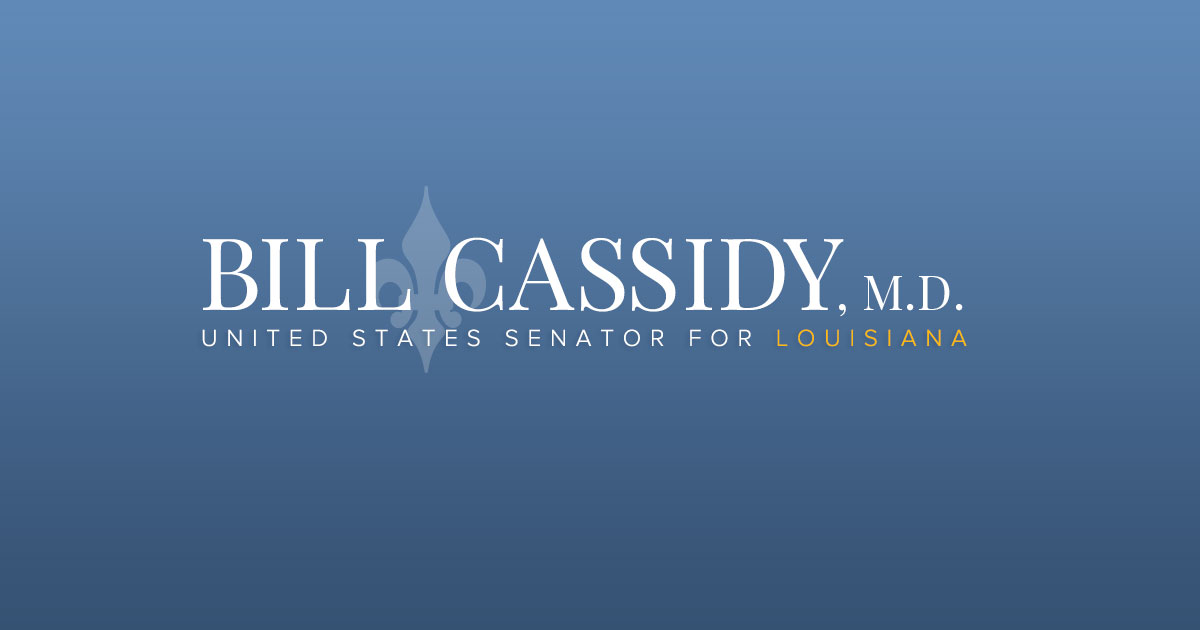Source: United States Senator for Louisiana Bill Cassidy
04.06.22
WASHINGTON – U.S. Senators Bill Cassidy, M.D. (R-LA), Tim Scott (R-SC), and 11 colleagues today urged the Department of Education to reconsider proposed rules redefining the Charter School Program, stripping parents of their ability to choose the best school for their child.
“Rather than overseeing and enforcing existing safeguards intended to ensure that high-quality schools are able to open or expand, the Department of Education is engaging in an aggressive attempt to dictate Federal, one-size-fits-all rules for charter schools,” wrote the senators. “This proposed rule would add new requirements for applicants that are entirely unrelated to student outcomes.”
“After teachers’ unions spent the pandemic keeping public schools closed while many charter schools stayed open, it is particularly appalling that the Department is working aggressively to limit charter school options for families in need,” continued the senators.
Cassidy and Scott were joined by Senators Marco Rubio (R-FL), Richard Burr (R-NC), Mike Braun (R-IN), Ron Johnson (R-WI), Roger Wicker (R-MS), Tommy Tuberville (R-AL), Todd Young (R-IN), John Cornyn (R-TX), James Lankford (R-OK), John Boozman (R-AR), and Kevin Cramer (R-ND).
Read the full letter here or below.
Dear Secretary Cardona,
We write to express our deep concern regarding the proposed rewrite of the bipartisan federal Charter Schools Program (CSP). Rather than overseeing and enforcing existing safeguards intended to ensure that high-quality schools are able to open or expand, the Department of Education is engaging in an aggressive attempt to dictate Federal, one-size-fits-all rules for charter schools. This unprecedented attempt at micromanaging a 28-year-old bipartisan program only serves to discourage charter schools from applying for these grants, effectively harming access to high quality schools for millions of students around the country.
This proposed rule would add new requirements for applicants that are entirely unrelated to student outcomes. Applicants would have to demonstrate “unmet demand for the charter school”. This means that having tens of thousands of children on charter waiting lists will not be enough. The Department wants evidence of “over-enrollment at existing public schools,” meaning that charter applicants in areas with shrinking enrollments, which includes most big cities, would most likely be rejected. Demand for charter schools is not just about the availability for any seat, but the demand for a high-quality seat, like those that exist at many of the nation’s premier charter schools. This requirement overrides the will of parents to affirmatively choose charter schools for their children and subjugates parents and students to the bureaucratic priorities set by the Department of Education. Since the pandemic, public charters have seen a substantial increase in demand. A logical approach would be to expand this program and build on what is already working for students and families. Instead, the Department of Education is taking direction from special interest groups, who seem more concerned with union membership rather than what is best for America’s students.
This rulemaking makes no mention of how any of these new, burdensome hurdles will improve student achievement or help serve America’s neediest students. In fact, “academic achievement” is only mentioned twice in the text of the rule and not in a manner that shows how any requirement will improve such achievement; rather, an application must only describe the current achievement of students in areas from which it hopes to draw enrollment. At a time when students are falling behind in record numbers, we need new and innovative approaches to our education system. This is the precise reason the CSP exists: to offer innovative teaching models and to increase autonomy for teachers and schools. These proposed rules would take away choice from families and give more power to unelected bureaucrats in Washington.
After teachers’ unions spent the pandemic keeping public schools closed while many charter schools stayed open, it is particularly appalling that the Department is working aggressively to limit charter school options for families in need. After teachers’ unions spent the pandemic keeping public schools closed while many charter schools stayed open, it is particularly appalling that the Department is working aggressively to limit charter school options for families in need. Public charter schools currently serve more than 3.4 million students across 42 states. The CSP, which has enjoyed bipartisan support since its inception in 1994, works to support these schools by providing federal funding to create promising new public charter schools, replicate successful public charter schools, and disseminate information about effective practices within charter schools. In fiscal year 2022, the CSP was funded at $440 million. Grants have benefited about half of existing charter schools and hundreds of thousands of predominately low-income students of color across the country.
Changes of this magnitude should be thoughtfully considered through the regular legislative process with proper input from relevant community stakeholders and Congress. Instead, the Department seems to be ignoring the will of Congress, through unilateral action. Therefore, we urge you to withdraw the proposed rule and engage with Congress on better ways to serve America’s students.
Thank you for your attention to this important matter.
###
